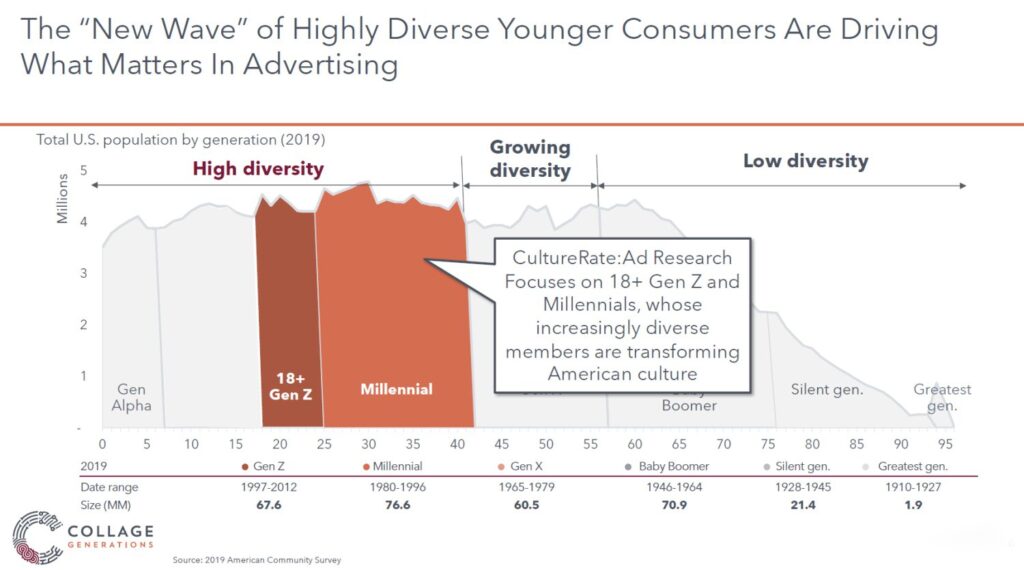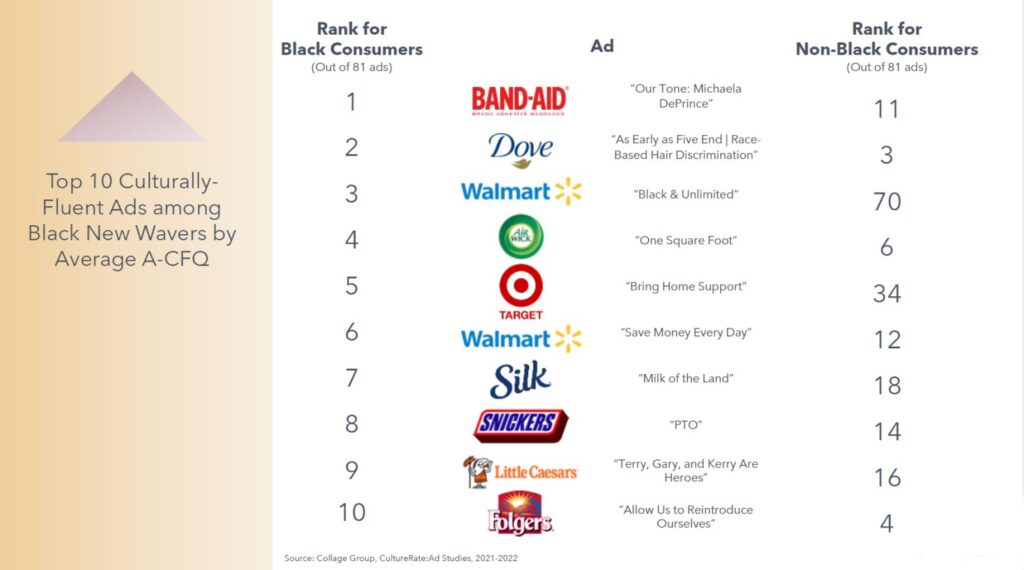Top Ads From 2022 That Resonate With Younger Black Consumers

In a recent Collage Group study, we analyzed more than 80 commercials in order to determine which advertisements resonated the best among younger Black consumers aged 18-42.
The analysis assesses ad performance using the Ad Cultural Fluency Quotient, or the A-CFQ. The A-CFQ measures consumer sentiment across four key dimensions. These include Brand Fit (the ad fits the brand), Relevance (the ad is for people like me), Message (the ad has an important message) and Enjoyment (the ad is enjoyable to watch).
The study was concentrated on adult Gen Z and millennials of all racial backgrounds. Collage Group refers to these as “New Wave” consumers. They have become a powerful buying force, and they also reveal preferences predictive of future marketing performance.

The findings show that New Wave Black consumers gravitated the most to 10 ads from these brands: Band-Aid, Dove, two ads from Walmart, Air Wick, Target, Silk, Snickers, Little Caesars, and Folgers.
Younger Black Americans who make up the Gen Z and millennial demographic were inspired by these 10 spots. While consumers were drawn to each advertisement for different reasons, jointly every one of these commercials connected with Black consumers through an engaging, authentic message.

Achieving a high score on “Message” is a distinguishing feature of all the ads deemed to be considered one of the top 10.
Most of the leading commercials prominently feature Black actors and actresses. Featuring these actors emphasizes the significance of representation in advertising for brands seeking to connect with the Black demographic.
When Black consumers witness authentically drawn Black actors in an ad, they are then inclined to take notice. Brands therefore should make note of that insight and use it to connect with these consumers.
For Black New Wavers, 49% say that it is important that commercials show people of their race or ethnicity, compared to 34% of non-Black New Wavers.
Brands are paying attention, and as a result, companies are enhancing how they represent multicultural people in their commercials. In general, Black Americans support companies who they view as loyal or as allies. To that point, 80% of Black Americans are more likely to go out of their way to purchase items from brands and companies that publicly support Black people and Black causes.
Out of all of the mentioned ads, five of the top 10 speak directly to being supportive of the Black demographic. Marketers recognize that young Black consumers expect brand support and in return, these buyers will respond by purchasing that brand’s products.
A commercial from Dove – the number two ranked ad for Black consumers in the study – brings an endearing message about a young Black girl encountering hair discrimination. After facing race-based hair discrimination throughout her childhood, she asserts that she will fight against the bias as an adult.
The spot turned out to be quite popular among young Black consumers, as 75% of Black New Wavers say they would react to the commercial on social media. A large majority of Black New Wavers, 71%, said they would discuss the ad with others, and 39% think that the best parts of the ad are the people and the characters.
The Dove commercial is successful at reaching the strong desire among Black New Wavers to “live their lives authentically,” which includes how they present themselves. It also scores high among this segment because of its focus on being real, and true to oneself, which drives Relevance and Message.
Moreover, it is essential that brands understand the possible negative ramifications of failing to market toward certain groups.
A portion of Americans say they will no longer use or buy from a brand whose advertising lacks racial and ethnic diversity. So, with Black Americans for example, this would mean by not targeting them, a brand is potentially losing 13 million Black customers.
The takeaway for brands is to appreciate that Black consumers do indeed reward those brands and companies that speak authentically to various Black group traits and cultural passions.
For brands looking to better engage with young Black consumers, they should take four steps:
- Explicitly show support for the Black community in ways that align with your brand’s functional benefits to drive a deeper sense of authenticity. High scores on Message (“This ad has an important message”) is a distinguishing feature of the best ads.
- Align your ad theme around the Black segment’s distinctive Group Traits.
- Feature key Black segment Passion Points in an authentic and natural manner.
- Don’t overlook the value of humor to connect with Black Americans.
Contact us to learn more about how you can drive authenticity and engagement among diverse consumers with access to our Cultural Intelligence Platform.